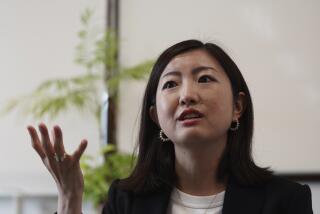Japan anti-smoking lawsuit is a David vs. Goliath
- Share via
YOKOHAMA, JAPAN — One plaintiff is a cancer patient. Another is represented by his widow. The third has emphysema and enters the courtroom in a wheelchair with tubes trailing from his nose. The three Japanese are waging a minnow-vs.-whale battle against Big Tobacco in one of the world’s most smoker-friendly countries.
Precedent suggests they’re likely to lose, but they hope their suit will at least draw attention to the dangers of smoking.
Even if they win, they’re unlikely to dent the finances of Japan Tobacco Inc., a former monopoly still half-owned by the government. The three are asking for a total of $320,000 from a company with $72.8 billion a year in sales.
Their larger goal, they say, is to gain stronger curbs on tobacco, and legal and social acceptance of a notion that much of the world now takes for granted: that smoking makes you sick.
They have a long way to go. There’s little of the concerted discouragement of smoking that has gained momentum in the West. Few bars and restaurants ban smoking. Only last year, to curb smoking among children, did a smart card become necessary to buy cigarettes from a vending machine.
A pack of 20 costs $3, less than a third what it costs in New York, and about 60% of it is tax.
Other countries print dire health warnings in bold letters and add pictures of dead babies, gangrenous feet and crumbling teeth. Here, in small print, they say, “Smoking can be one of the causes for lung cancer.”
Secondhand smoke? “Tobacco smoke has a harmful effect on people around you, especially infants, children and the elderly. When smoking, please be careful of those around you,” the warnings say.
Japan Tobacco officials still flatly deny passive smoking is a problem, arguing that the dangers come from burning cigarettes left on an ashtray -- not secondhand fumes.
The firm has argued in Yokohama District Court that it has no case to answer because smokers are free to quit any time, smoking is legal and cancer has multiple causes. It’s the same defense that gained it victory the last time it was taken to court, in 2003.
The current case began in January 2005. Since then, co-plaintiff Kenichi Morishita has died of pneumonia and bacterial infection at age 75. That leaves two living plaintiffs: 67-year-old cancer patient Koreyoshi Takahashi, who has one lung, and Masanobu Mizuno, the emphysema sufferer, a former mechanic who is also 67 and smoked from age 15 to 51.
With final arguments over, the judge has promised a ruling Jan. 20.
Although the case has attracted little media attention, there are signs that even Japan is beginning to kick the habit.
Among adult males, the number of smokers has been falling and now stands at 39.4%, compared with about 24% in the U.S., according to the Japanese Health Ministry and the American Lung Assn.
Cigarette ads no longer appear on TV, though Japan Tobacco gets on the air with ads that discourage tossing butts on the street or in trash cans.
There are more smoke-free cabs and areas on train platforms. Some communities have passed ordinances allowing small fines for smoking on the street.
Smoke-free bars and restaurants are enough of a novelty to have spawned a backlash against “smoker bashing.”
In April, a major restaurant chain opened Cafe Tobacco, a Tokyo coffee shop billing itself as a haven for smokers. It’s proved popular with people such as 28-year-old Kousuke Kishi, who takes his coffee with a Marlboro Light.
“I don’t want to live an extra year or two by giving up what I love to do,” said Kishi, 28, manager at a consultancy.
The lawsuit demands sterner warning labels on cigarettes, a ban on cigarette vending machines and an acknowledgment that smoking is addictive and harmful.
“When I began smoking, about 80% of men were smokers,” Mizuno said. “The advertising phrase was, ‘You’re healthy when a cigarette tastes so good.’ ”
In the U.S., President Obama has signed a law empowering the Food and Drug Administration to regulate tobacco products, and while that got little attention in the Japanese media, Obama’s own struggle to quit smoking has been an inspiration to Mizuno.
“Times have really changed,” he said. “The people’s victory is near.”
More to Read
Inside the business of entertainment
The Wide Shot brings you news, analysis and insights on everything from streaming wars to production — and what it all means for the future.
You may occasionally receive promotional content from the Los Angeles Times.










